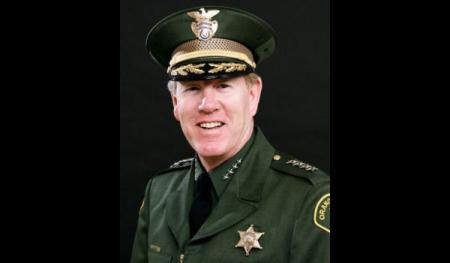The image of the Western cowboy lawman is so ingrained in American culture as to become cliched. But while Marshal Matt Dillon and Rooster Cogburn are the stuff of Hollywood and TV legend, Orange County Sheriff Brad Gates was the real deal.
Gates died Friday, Oct. 25 in his San Juan Capistrano home after a long illness. He was 85.
Endorsed by Western screen legend and later friend John Wayne, who knew a thing or two about lawmen on celluloid, Gates styled himself as an old-school law-and-order Sheriff. But he was also a supremely skilled politician.
The 11th Sheriff of Orange County, Gates helped guide the County and law enforcement through six terms from 1975 to 1999 and some of its most challenging times, including the county’s bankruptcy in 1994 .
“Orange County has lost a legend and our department has lost one of our most beloved family members,” Sheriff Don Barnes said in a statement. “Although it has now been over 24 years since Sheriff Gates retired, much of what our department has in place today is a result of initiatives he began.”
“He was an unbelievable leader who always did what he thought was right,” said Paul Walters, the former Chief of the Santa Ana Police Department, who met Gates when Walters was a young recruit and Gates was an imposing sergeant. “He was in full command. Even then I knew he’d go as far as he wanted.”
Former Costa Mesa and Beverly Hills Police Chief David Snowden, who worked closely with Gates on a number of issues, invoked “legend” as well when referring to Gates.
“He was probably the best Sheriff Orange County ever had,” Snowden said. “He was Mr. Law Enforcement.”
Only 35 when he won the Sheriff’s office in a landslide election, Gates was quick to consolidate power in local law enforcement, taking over airport, harbor patrol, and jail operations, as well as creating a central county morgue.
During the bankruptcy travails, he was one of three department heads appointed by the Board of Supervisors to lead county recovery efforts.
Taking a huge political risk during a deeply conservative era of O.C. politics, Gates became a leading proponent of Measure R, a failed half-cent sales tax hike designed to help lift the county out of its financial crisis while maintaining key services.
That brought him into the crosshairs of former supporters who threw their support behind Michael S. Carona, who won the sheriff’s post in 1999, after Gates retired, but later was imprisoned on a federal criminal corruption charge.
“He was a guy who was not afraid to take a risk and tell you what it was like and what he thought,” Snowden said of Gates.
He also faced controversy and was successfully sued during his tenure, but remained beloved in the law enforcement community, in part because of his cops-first attitude.
Wyatt Hart, the former Mayor of San Juan Capistrano, O.C. Sheriff’s captain under Gates, and a longtime friend, said Gates was approached to run for state political office, but declined. To Gates, he said, politics was just an unavoidable side to his job.
“He was a sheriff that was a politician by necessity,” Hart said.
Long list of accomplishments
For all his old-school attitude, Gates was also willing to explore technology and collaborate with local, state, and federal agencies.
“He was a traditional law-and-order leader,” Walters said. “But he was also innovative.”
Gates was at the cutting edge in the war on drugs and helped spearhead the multi-agency Regional Narcotics Suppression Program (RNSP) in 1986 as well as the Drug Use is Life Abuse program for school-aged youth.
Gates gained national attention when President George H.W. Bush came to South County to visit the notorious Rancho del Rio after the 213-acre property was seized by authorities during a drug investigation. He was also appointed as a member of President Bush’s Drug Advisory Council.
In a statement, Barnes credited Gates for numerous accomplishments. These included:
- Construction of the county’s Intake Release Center, a model for appropriate processing and placing of those booked and released from O.C. jails;
- Relieving prison overcrowding by expanding the maximum security Theo Lacy jail complex;
- Guiding the county-wide Coordinated Communications System;
- Instituting new technologies at the crime lab;
- Expanding civilian job classifications;
- And leading the way in the use of video cameras installed in patrol units.
Cowboy up
Gates, who was born in 1939, grew up and spent his life in San Juan Capistrano, where he starred in basketball at San Juan .
Throughout his life he developed an appreciation of the Southwest and cowboy culture.
His office was decorated with Western art and artifacts, engraved belt buckles, a mounted photograph of the Duke, and autographed memorabilia from Wayne.
The film star not only supported Gates for sheriff, but after Wayne died in 1979, his family continued to endorse and campaign for Gates, according to Hart.
Gates wasn’t averse to donning a Stetson hat, which just added to his larger-than-life stature.
Snowden, a fellow aficionado of cowboy culture, introduced and accompanied Gates to the Golden Boot Awards, which celebrate Westerns in film and television.
“He was a student of Western history,” Snowden said.
Gates was also an accomplished horseman and owner of the Ortega Equestrian Center, where he stabled several horses.
He was a member of the Portola Riders, a group of business, military, and other leaders from across Southern California, who annually participated in three-day horseback and camping excursions through undeveloped land at Rancho Mission Viejo. Gates also participated with Hart in the annual Rancheros Vistadores Equestrian Parade and 60-mile riding and camping event in Santa Barbara County.
During those trips, Gates would leave the pressure and his life as a politician behind and just enjoy the Old West vibes and music around the campfire.
“He didn’t let those things overlap,” Snowden said of business and pleasure. “He liked riding horses, and just being one of the campers.”
Behind the tough, cowboy up, plain-spoken, law enforcement exterior, Gates also had a deep, caring side, according to Hart.
In 1982, Hart’s son Todd was paralyzed while playing in a college football game. Hart said Gates came by every night to sit with Hart and his son.
“He had a big heart,” Hart said. “He did that with all his troops.”
Sheriff Barnes, in written comments about his predecessor, also noted Gates’ horse riding, cowboy hats and affinity for all things Western. But it went beyond that for Barnes.
“In Old West times, a peace officer was commonly referred to as a ‘lawman.’ Lawmen like Wyatt Earp are credited with bringing order to the chaos of the Wild West and making the frontier a safe place to live and raise a family,” Barnes wrote. “The West was tamed long before Brad Gates became Sheriff, but like the lawmen before him, he ensured a rapidly growing county was kept safe.”
Gates is survived by his wife Deedee; son, Scott; daughter, Deedee Jo; brothers, Stillman and Robert; sister, Margaret Lapham; and three grandchildren.
 Behind the Badge
Behind the Badge



